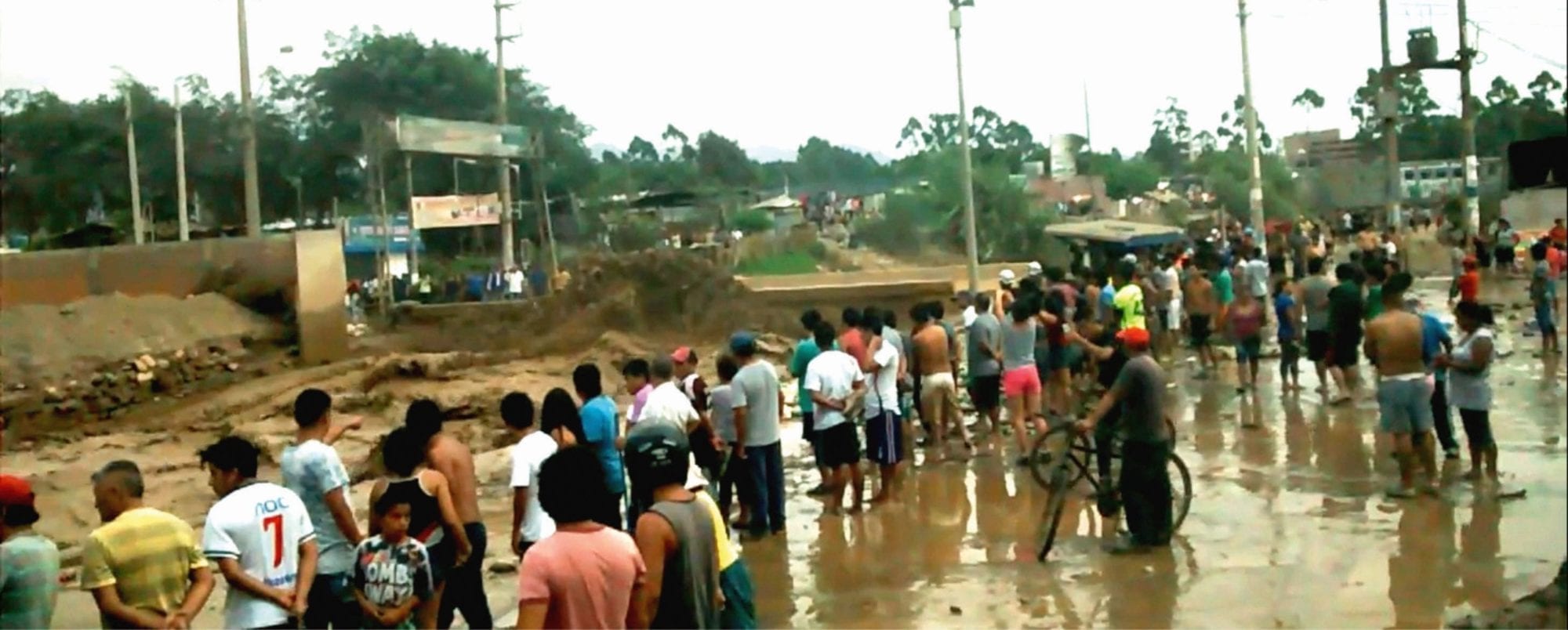
Mar 23, 2017
Racing to help the more than 640,000 people affected by massive flooding along coastal Peru, trade unions, faith-based organizations, academic institutions and other civil-society organizations have mobilized to ensure lifesaving supplies and other items reach affected communities.
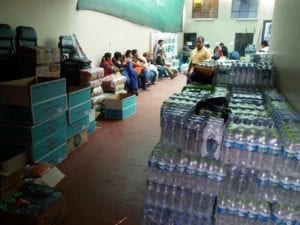
Cerro Verde mine workers union in Arequipa collect goods to donate to flood victims. Credit: Rommel Arenas
Since December, two dozen provinces in Peru have witnessed a period of intense rains and destructive mudslides that have killed 75 people, affected 157,000 homes, inundated hundreds of acres of farmland and destroyed 1,100 miles of public roadways and 159 bridges. The Peruvian government is working to clear roadways and affected areas of debris. Infectious diseases spread by mosquitos, including dengue and Zika, are now an increasing concern for communities where standing water is an issue. The Peruvian National Weather Service has projected that the rains will continue through the first week of April.
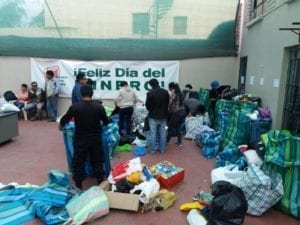
A range of unions in Peru are providing assistance to workers and their families displaced from recent flooding. Credit: Rommel Arenas
The National Federation of Textile Workers, FED-CUT (healthcare workers federation), confederations such as the Peruvian General Workers Confederation (CGTP), the National Federation of Peruvian Textile Workers and local unions in the mining sector in Arequipa are collecting drinking water, non-perishable food, clothing and other basics for their members and affected communities. Unions are slowly beginning to distribute assistance as roads become passable. The Peruvian Federation of Civil Construction Workers (FTCCP) has led rebuilding efforts of homes in Lima.
Workers Will Suffer Economic Hardships after Floods
The disaster will have long-term impact on workers, said Samantha Tate, Solidarity Center Peru country program director.
“For example, farm workers in La Libertad, one of the areas hardest hit, cannot go to work because there is no way to get to their workplaces or move product. These workers—who don’t make a decent wage as it is—are not being paid at all now,” she said. “Meanwhile the prices of food and consumer goods have increased because of reduced supply and price gouging. This is a disaster that will have the ripple effects of increased poverty, hunger and isolation for Peruvians outside of Lima.”
Flooding is not a new phenomenon on the Peruvian coast, however rains have intensified over recent years. Many of the most affected provinces have budgets for disaster risk reduction, prevention and relief. However a recent investigation shows that much of the funding to mitigate life-threatening natural disasters has gone unspent.
Send Donations to Red Cross in Peru
The CGTP is blaming corruption and indifference for the loss of life, widespread damage, lack of basic services and scarcity of food, water and medicines in affected areas. In a statement, the CGTP demands that the national government sanction local authorities who did not address their region’s vulnerability to flooding and put their citizens at grave risk. The confederation also calls for tax breaks for the wealthiest individuals and companies—such as exemptions for the mining industry—to end and the immediate collection of past-due corporate tax debt to help pay for a speedy recovery.
The Solidarity Center encourages anyone interested in helping to donate to the Red Cross in Peru and will announce later If Peruvian unions seek additional funding for their relief efforts.
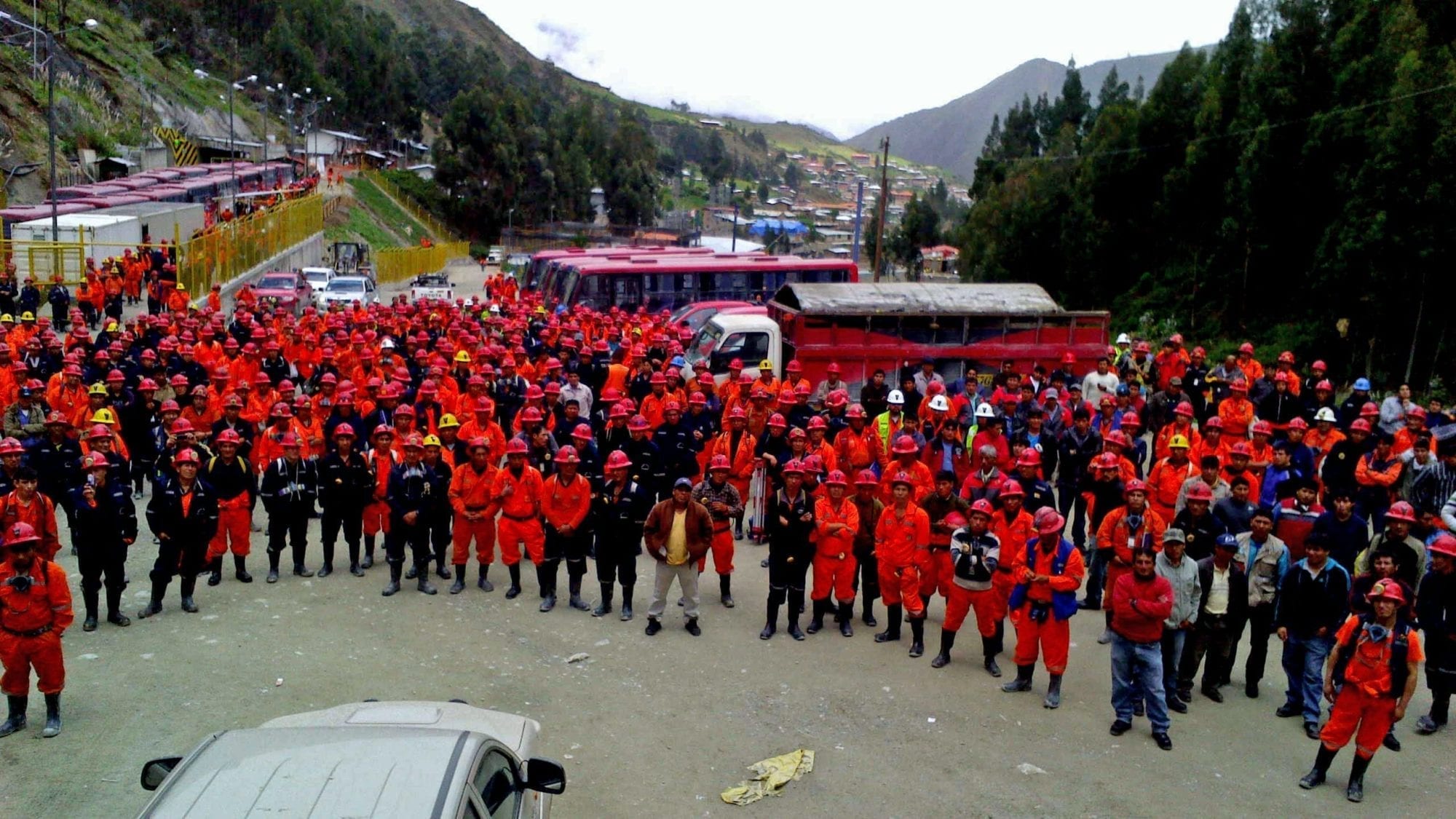
Mar 29, 2016
Oscar Muro, Solidarity Center program officer in Peru, reports on his late February fact-finding journey to the Minera Aurifera Retamas (MARSA) mine, where subcontracted mineworkers, represented by a strong union, won a national labor inspection finding that calls for 2,464 outsourced workers to be moved to permanent contracts. The workers subsequently went on a weeklong strike to protest the employer’s appeal of the judgment and a ruling by the regional labor authorities that MARSA should not be fined for misclassifying workers. The national labor inspection office indicates it will return to the mine in a few weeks to ensure the company has correctly classified miners.
……………..
Together with Ricardo Juárez, secretary-general of the Federation of Mine and Metalworkers of Peru, and Elder Villalobos, secretary general of the union of workers of the companies of MARSA, I traveled to the mining center in the mountains of La Libertad to attend the union’s extraordinary general assembly. There, the secretary general told the 4,500 workers in attendance that, following mine inspections, the national Superintendent of Labor Inspection had ruled in favor of 2,464 of 4,000 subcontracted workers, stipulating that they become permanent workers.
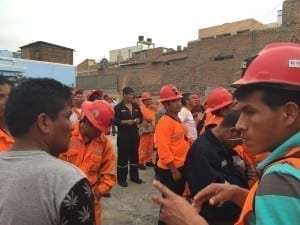
Miners are standing strong in their demands for permanent contracts. Credit: Solidarity Center/Samantha Tate
Many MARSA workers have labored in dangerous conditions for up to 20 years, but without a contract. Their “non-permanent” status means their livelihoods are jeopardized if they raise safety issues with their employer, or demand decent wages that allow for a life with dignity.
In January, one miner died on the job, and two miners perished in 2014. In November 2015, there was a deadly radiation poisoning and suffocation incident at the Taurus mine.
Mine is Rich, Yet Residents still Poor
The MARSA mine, 4,000 feet above sea level in the Southern Highlands, produces gold in large quantities and ranks among Peru’s top five gold producers. The journey to MARSA takes more than 14 hours from the northwestern coastal city of Trujillo. To reach the mining center, we had to cross hill after hill on a single-lane road. When our bus encountered a vehicle coming the opposite direction, the vehicles struggled to pass each other on the narrow stone trail. We made the trip to join our co-workers who need us, and thank God, everything went well.
Some 7,000 people live in Llacuabamba, the village where the MARSA mine is located. Despite the wealth beneath their soil, the residents do no benefit from investment, such as proceeds from mining licenses. Instead, their village suffers from poor sanitation infrastructure and is so isolated that residents do not receive newspapers and often do not have access to television because of the weak Internet signal.
Solidarity with Miners
Together with Juárez and Villalobos, we conveyed to the workers that we stand in solidarity with them in their struggle until they achieve victory: worker rights through permanent contracts.
During this journey, we also learned about informal mines in the area, which employ between 3,000 and 5,000 miners. Further, at the nearby Consortium Horizon mine, the more than 4,000 employees have sought to form a union several times, only to see many workers fired. We have much work ahead to assist all of these workers in getting permanent contracts and the safe and healthy working conditions all workers deserve.
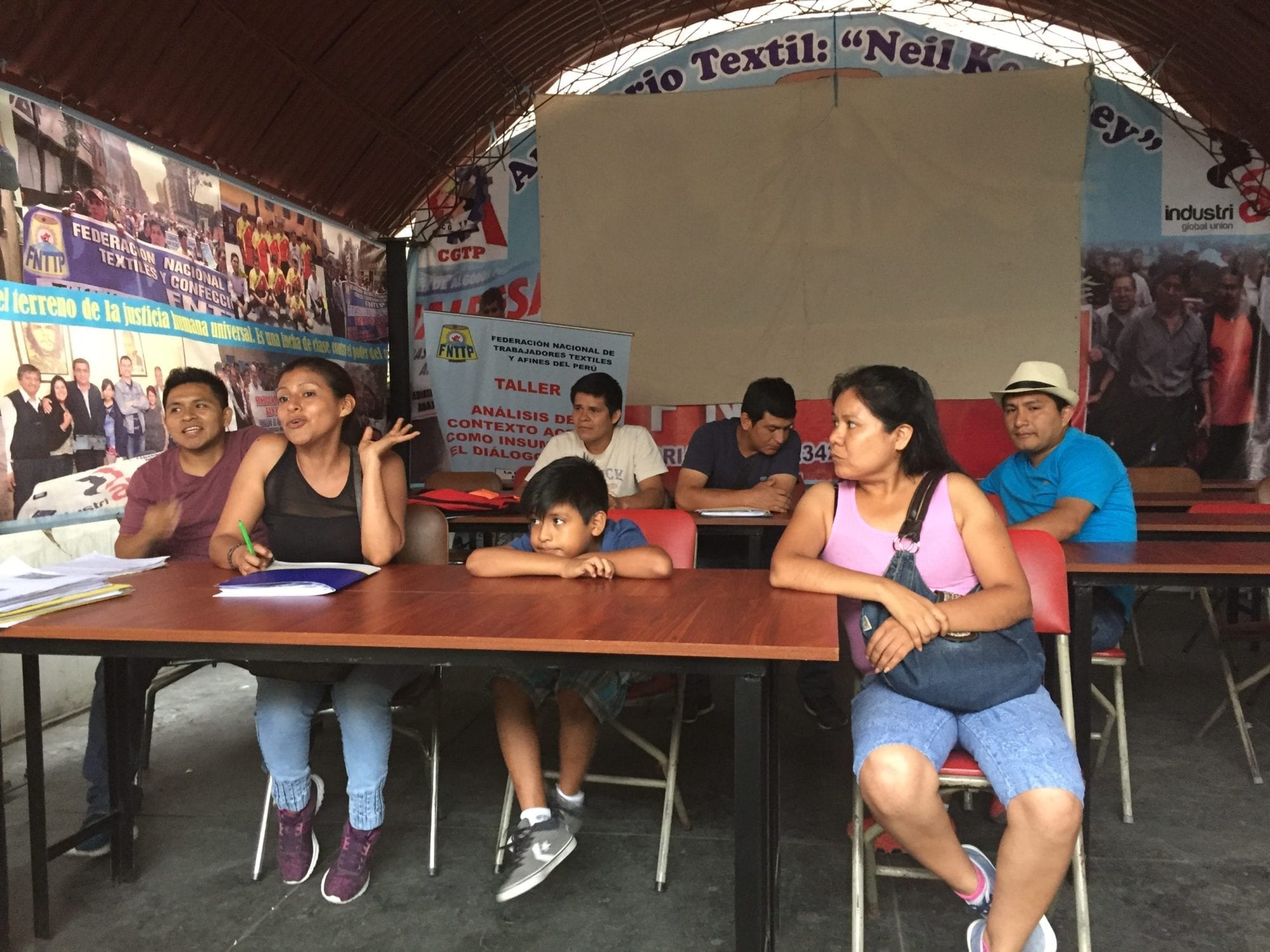
Feb 16, 2016
Peru’s National Federation of Textile Workers is calling for immediate reinstatement of 11 textile workers who were fired less than a month after they formed a factory union in Lima. The factory, which employs more than 1,400 workers, produces high-fashion jeans for the Peruvian market.
The garment workers, many of whom had worked at the plant between nine and 20 years, created a factory union in January to improve their workplace conditions. Although most textile workers in Peru are employed on short-term contracts, the workers who lost their jobs have more stable employment because they are on indefinite contracts—yet they still risked their employment to improve working conditions. (See a video of workers protesting the company’s actions.)
After the garment workers formed the union, they say managers called union leaders into one-on-one captive audience meetings and presented each worker with a set of threats and incentives to abandon the union.
Helen Vallejos Reyes, a garment finishing worker with 20 years experience, said a manager told her to “accept the money we are offering you or we’ll see you in court.” She says managers kept her and other union members in isolation for more than five hours at the factory. Despite these pressures, Reyes says, “we all decided to not take their offer.” When the workers refused to leave the factory after the one-on-one meetings, which concluded before their shift ended, managers fired them, saying they illegally occupied the factory.
Lorena Chavera, a union organizer who has accompanied the garment workers as they sought to form a union, is hopeful about the outcome. “We spoke a lot before the workers decided to join the union,” she says. “They knew the risks they faced and they chose to go forward. I know what it feels like to lose your job for standing up, but I am confident that we will see justice for these workers because it is their constitutional right to organize and call for fair treatment.”
The National Federation of Textile Workers is working with the union to document the anti-union campaign, taking the case to government labor inspectors and the Ministry of Labor, and seeking recourse through the legal system.
Textile workers in Peru increasingly are mobilizing for their rights at work, and this new union has affiliated 22 new workers over the last couple of weeks despite employer opposition. Workers have formed two unions at factories since January, both affiliated with the National Federation of Textile Workers. (The Textile Workers union educates workers about their rights through information pamphlets and in one-on-one discussions.)
Peru has ratified International Labor Organization (ILO) conventions on the freedom to form unions and collectively bargain.
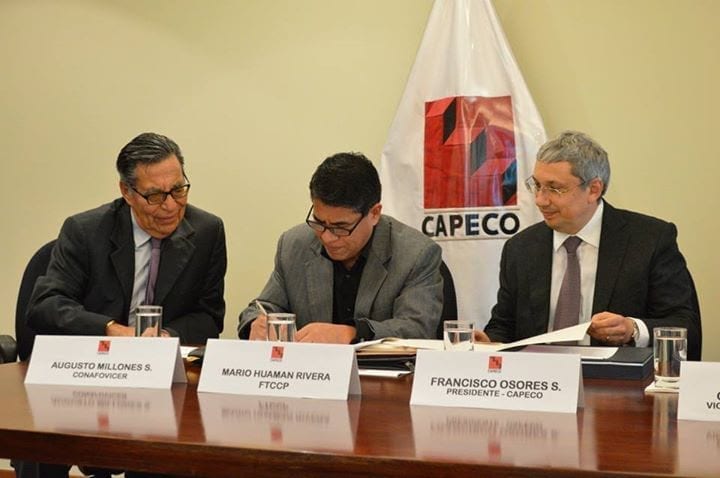
Aug 24, 2015
Construction workers in Peru are celebrating a new contract that significantly improves wages and benefits, and are hailing a new legislative order, which in part addresses ongoing violence against union members in the building and construction trades.
The new one-year contract gives workers up to a 5 percent wage increase and includes education benefits for workers’ children up to age 22. Construction workers also will receive bonuses for hazardous work, time off when working more than 27 consecutive days on a project, and an additional 25 percent of their wage when working at night.
The FTCCP also negotiated an agreement with the Peruvian Chamber of Construction to conduct free professional training courses at the federation’s training and recreation centers in conjunction with the National Training System for the Construction Sector Ministry of Labor and Employment Promotion.
“The collective bargaining agreement benefits the workers, democracy and the country,” La Federación de Trabajadores en Construcción Civil de Perú (Federation of Civil Construction Workers of Peru, FTCCP) said in a statement.
With the new contract, FTCCP members’ average base pay will be $750 per month, and up to $1,250 per month with overtime. The vast majority of Peru’s workers, 70 percent, are employed in small and micro enterprises where workers generally earn a $250 per month minimum wage. Approximately half of workers in the construction sector are union members. Non-union workers can request “me too” clauses for their individual contracts that bring them up to the union wage scale.
In another sign of construction workers’ growing influence, Peru’s executive branch published a legislative decree in mid-August that charges police special units with preventing violence against construction workers.
More than a dozen construction union leaders have been murdered in the past five years, most recently last month, when Miguel Cotelo Villanueva was murdered leaving a union organizing meeting in Casma, Peru.
In addition, the decree takes steps to ensure safety and health on construction sites by requiring local governments to notify the police when construction permits have been filed, enabling timely workplace inspection and enforcement of labor and safety standards.
The decree also mandates that union dues must be paid by the employer into the union’s financial institution.
The FTCCP is a member of the Confederación General de Trabajadores del Perú (General Confederation of Workers in Peru, CGTP), both Solidarity Center allies.
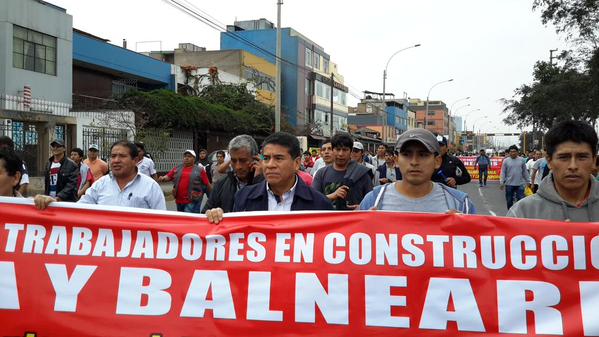
Jul 24, 2015
One construction union leader was killed and another injured as the men left a union organizing meeting in Casma, Peru, this week.
Miguel Cotelo Villanueva, a member of the Federación de Trabajadores en Construcción Civil de Perú (Federation of Civil Construction Workers of Peru, FTCCP), Peru’s largest construction union, is the most recent of 14 construction union leaders murdered in the past five years. Victor Rodas, another FTCCP union leader, was murdered on July 10 in similar circumstances.
Union leaders say the violence stems from groups that have set up fake construction unions and are waging attacks on FTCCP leaders and members if they do not participate in their extortion schemes. According to FTCCP Social Security Secretary Félix Rosales, Cotelo and FTCCP General Secretary Silvestre José Mota, who was injured in the attack with Cotelo, received death threats by phone and text after they refused to take part in extortion activities.
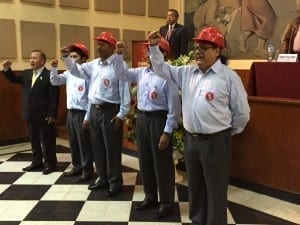
STCCLB leaders are sworn in to office after a union election. Credit: Solidarity Center/Samantha Tate
The FTCCP is a member of the Confederación General de Trabajadores del Perú (General Confederation of Workers in Peru, CGTP), and both are calling for a meeting with government officials and employers to address the issue of fake unions, and are asking the Ministry of Labor to remove the fake unions from its records.
Buenaventura Vera Perez, secretary-general of the Lima and Environs union (STCCLB), says the violence is in part a campaign to eliminate collective bargaining rights, because the FTCCP and its affiliates are the only unions that negotiate collectively.
“There is no political will to end the violence,” Buenaventura says. “Authorities say that they don’t know where the guilty parties are, which is ridiculous. We have given the police names. Until when do we have to live with this constant threat?”
Perez made his remarks yesterday at a swearing-in ceremony for STCCLB leaders, who were elected after 4,370 construction workers cast their votes in democratic elections
Also speaking at the ceremony, CGTP Vice President Juan José Gorritti says that while the government sends police to target and even assault anti-mining protestors, the government does not dispatch the officers to address the violence in the construction industry and ensure safety for the workers.









